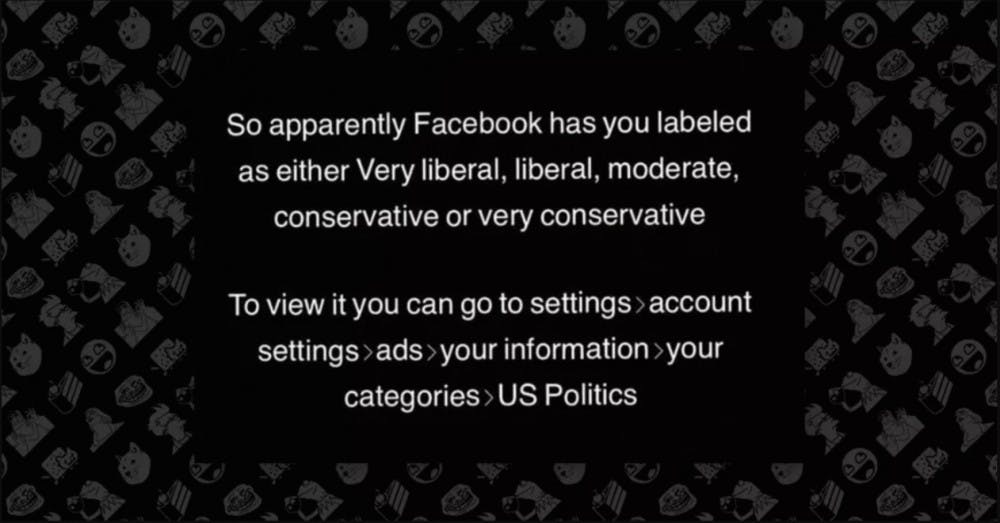Waking up and browsing Facebook is a common, often daily activity for the average individual in this day and age. Just as common is the barrage of memes and graphics plastered across the screen when logging in.
These memes and graphics vary in accuracy, with some ranging from insanely inaccurate to strangely true. One graphic circulating on the site can be filed under the strangely true category.
Amidst the growing concern surrounding Facebook’s use of user information came a graphic reading, “So apparently Facebook has you labeled as either very liberal, liberal, moderate conservative or very conservative.”
The meme then instructs users to find their labels stating, “To view it you can go to settings > account settings > ads > your information > your categories > U.S. Politics.”
While Facebook CEO Mark Zuckerberg is facing much tension during his congressional hearings regarding how his company handles user data, a larger unasked question may be this: how has Facebook’s handling of this data affected users already?
According to an article by the Washington Post, Facebook revealed “that a voter profiling firm hired by Donald Trump and other Republicans had improperly used data from 270,000 users of the social media platform.”
The concern regarding this data should not just be how this data can affect the political world, but how it impacts the users.
If an individual's data is sold to advertisers, political parties and others who seek to shape how someone views the world, then what kind of impact will these advertisers have on their audience in the long run?
It is one thing for advertisements, be it political or not, to grab an individual's attention. But what if the advertisement had no competition? I am not speaking about shopping outlets showing up in the sidebar on your page, because you purchased a dress from those outlets before.
I am talking about how a political label could control not just which candidates are advertised to you, but whether the news you receive is partisan or nonpartisan. How whether the coverage you receive will expand your knowledge and challenge your views or placate to these views cutting you off from not just the world but even fellow Facebook friends and family if your labels are not the same.
A recent Pew Research study published on March 29 states, “For both Republicans and Democrats, the top reason to belong to a party is a belief that its policies will benefit the country. But sizable majorities in both parties cite the other party’s harmful policies as a major factor.”
However, a Pew Research study from Oct. 5, 2017 showed the intense partisanship bleeds into issues both parties agree with — the results of these studies should be somewhat jarring.
Get content from The Daily Lobo delivered to your inbox
We are no longer looking at two parties with members believing their values and policies will drive the nation in a positive direction, but rather members looking at their fellow politicians, Americans and often family members as the enemy.
If the above studies do not give cause for concern, then a third may do so.
On April 10, Pew Research published a study diving into facts related to Americans and Facebook. The study stated 68 percent of adults in the United States use Facebook. It goes on to say that the social media platform was popular among all adults, growing in popularity in even its lowest demographics.
The study states, “Nearly half of all U.S. adults (45 percent) get news from Facebook.”
Meaning, nearly half of Americans shape how they view the world, including their political parties, based on what news they receive from Facebook.
The idea that news is distributed to all Facebook users, neatly packed into labels like very liberal, liberal, moderate conservative or very conservative could be the social network’s largest fault.
The result of these studies show a divide on issues and values that both parties agree on. The studies also reveal that members see opposing parties’ policies as potentially harmful to their country.
Is there any wonder why the divide runs so deep? Or why policies and ideas that both sides agree on cannot be passed into law?
It only makes sense that this is the result of the way information and news is perceived and distributed to Facebook users.
After all, how could anyone ever agree with their enemy?
Nichole Harwood is the culture editor for the Daily Lobo. She primarily covers alumni and art features. The views presented in this column are her own. She can be contacted at culture@dailylobo.com or on Twitter @Nolidoli1.






